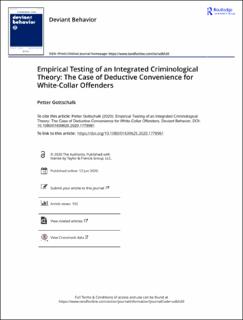Empirical Testing of an Integrated Criminological Theory: The Case of Deductive Convenience for White-Collar Offenders
Journal article, Peer reviewed
Published version
Permanent lenke
https://hdl.handle.net/11250/2685247Utgivelsesdato
2020Metadata
Vis full innførselSamlinger
- Publikasjoner fra CRIStin - BI [1015]
- Scientific articles [2173]
Originalversjon
Deviant Behavior. 2020, DOI: 10.1080/01639625.2020.1778961 10.1080/01639625.2020.1778961Sammendrag
This paper presents the integrated theory of convenience with its dimensions and structural model. Convenience statements derive from the structural model. The research suggests that offenders will find crime more convenient than non-offenders will. One hundred and eleven business students were either potential offenders or non-offenders based on their responses in survey research. Business students who found it understandable that top executives and others in privileged positions commit white-collar crime are likely offenders, while students who did not find it understandable are likely non-offenders. The empirical test illustrates that assumed offenders find more motive convenience, opportunity convenience, as well as behavioral convenience by crime when compared to assumed non-offenders

